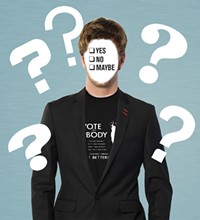Ready to Change Utah's Constitution?
The skinny on the amendments you'll be voting on next Tuesday
By Colby Frazier @colbyfrazierlpFrom the top of the state to the bottom, there are only a handful of things that every single ballot in the state of Utah will have in common when voters head to the polls Nov. 4. Three of these items are constitutional amendments that, though extremely unsexy, could alter the course of Utah law.
The constitutional amendments, classified as Amendment A, B, and C, were approved by the state legislature and placed on the ballot during its last general session.
One proposes to alter the political makeup of the Utah State Tax Commission by tossing aside a rule that requires the commission to be made up of Democrats and Republicans. The second aims to alter the term length of an appointed lieutenant governor—which, opponents say, could make it possible for a governor to rise to power and serve for up to three years without ever being voted on by the public.
The third amendment aims to allow the office of lieutenant governor, state auditor and state treasurer to hire private legal counsel, to the tune of up to $120,000 per new position. Currently, these offices rely on the Attorney General's Office for legal advice.
None of these amendments have courted controversy, and have generated next to no publicity. As a result, voters might be surprised when, in between selecting judges they will hopefully never meet, they are tasked with crossing out lines and penning some new ones on the state's constitution.
With that in mind, and your voting implement in hand, the following is an overview of the three constitutional amendments that are on the table.
AMENDMENT A
The Utah State Tax Commission is a four-member band of folks that administers and supervises Utah's tax laws. The members are appointed by the governor and approved by the Utah Senate. Current state law requires that no more than two commissioners can belong to the same political party.
Since part of the tax commission members' jobs is to settle tax disputes, supporters of the amendment say their job is no different from that of an actual judge. And where justice is concerned, politics have no place.
"The issue has to do with the fact that a tax commissioner's main role is to adjudicate taxes," says Sen. Howard Stephenson, R-Draper, who introduced the amendment during the legislative session and has been the president of the Utah Taxpayers Association for the past 26 years. "We don't currently require a partisan affiliation of judges, and neither should we for tax judges that serve as tax commissioners."
By limiting the pool of qualified tax commission candidates to the political party in which they subscribe, Stephenson says, it has been difficult in the past for the governor and the senate to find qualified candidates.
Rep. Joel Briscoe, D-Salt Lake City, wrote the opposition to the amendment in the state voter guide. Briscoe says that the partisan makeup of the commission is an important "check and balance" that should not fall by the wayside.
Because Utah's governors and the vast majority of its state elected leaders are Republicans, he says, the tax commission has historically been handpicked by Republicans. And Briscoe says it's important that the partisan makeup of the board isn't too far to either side of the aisle.
"This provision has kept and will help keep the tax commission politically neutral, which will benefit and protect the citizens of Utah," he writes.
Briscoe also says that the desire by his Republican colleagues to make the tax commission nonpartisan strays from their contention that most other bodies in the state, like the state school board, for instance, should remain partisan.
Charlie Roberts, a spokesman for the tax commission, says the commissioners themselves, two of whom are Democrats and the other two Republican, have not taken a position on the ballot. Nor, he says, did the commission seek out the constitutional amendment.
"It works just fine the way it is now, and I'm sure if the voters were to decide otherwise, it might work fine as well," he says.
AMENDMENT B
Constitutional Amendment B would require that the lieutenant governor and governor be elected during the same election year. Current law allows, under certain circumstances, for a lieutenant governor to be elected during a mid-term election, for example, while the governor wouldn't face election for another two years.
In his argument in favor of the amendment, Sen. Stephen Urquhart, R-St. George, says that as written, state law could allow for a lieutenant governor to serve two years longer than the governor that made the appointment. The amendment, he writes, would require that the lieutenant governor and governor run in tandem.
The scenario of governors and their lieutenants vacating office before their terms expire has become a recent issue in Utah. When former Gov. Jon Huntsman Jr. vacated his office in 2009, his lieutenant governor, Gary Herbert, rose to the top job. Gov. Herbert then picked his lieutenant governor, and roughly a year later, the two faced an election to finish out the remaining two years of Huntsman's term.
Urquhart says the amendment simply requires that an appointed lieutenant governor face election at the same time as a sitting governor.
But Rep. Jim Nielson, R-Bountiful, says this could create a situation where an appointed lieutenant governor could rise to governor and serve for years before facing an election. This scenario could play out if a lieutenant governor stepped down early during a four-year term, the governor then appointed a replacement, followed by an early exit by the governor. The appointed lieutenant governor—having never faced the voters—would then take office.
AMENDMENT C
The single year that former Attorney General John Swallow served as the top-ranking law-enforcement officer in the state continues to shake Utah's legal and political foundations.
And so it is with Constitutional Amendment C, which would allow the offices of lieutenant governor, state auditor and state treasurer to hire private legal counsel. Under current state law, these offices must rely on the legal advice of the Attorney General's Office.
But in 2013, the lieutenant governor's office commenced a lengthy investigation into the alleged criminal activities of Swallow and his predecessor, Mark Shurtleff. Although the ballot arguments don't directly reference the two former attorneys, who have been charged with a combined 21 felonies, it does cite "recent events" that have shown that conflicts of interest can exist when the Attorney General's Office must provide legal advice to an office investigating it.
Opponents, however, say that allowing these offices to retain private legal services is a costly overreach of power.
Senate President Wayne Niederhauser, R-Sandy, said supporters of the amendment could only point to "rare or hypothetical cases" that would justify retaining private counsel.
Niederhauser also says that legal advice from the Attorney General's Office is supposed to be independent, while private counsel would presumably represent the interests of the politicians who hire them.
"Under this proposal, the state would not have better attorneys or better legal advice," Niederhauser wrote of the amendment, which could cost taxpayers up to $120,000 per position that is created. "It would—for good or ill—have attorneys who are beholden to the personality and agenda of individual politicians."
More by Colby Frazier
-
Fire Line
UFA Board considers recouping bonuses paid to former chiefs and turning investigation over to law enforcement.
- Jan 25, 2017
-
Home Sweet Home?
How a single real estate deal highlights a city in flux and in crisis.
- Jan 4, 2017
-
Dead Red
That Utah could end up voting something other than Republican proved delusional.
- Nov 9, 2016
- More »
Latest in News
Readers also liked…
-
Raise a glass for E.L.T Harrison, architect of the Beerhive building on Main
Small Lake City
- Oct 11, 2023






